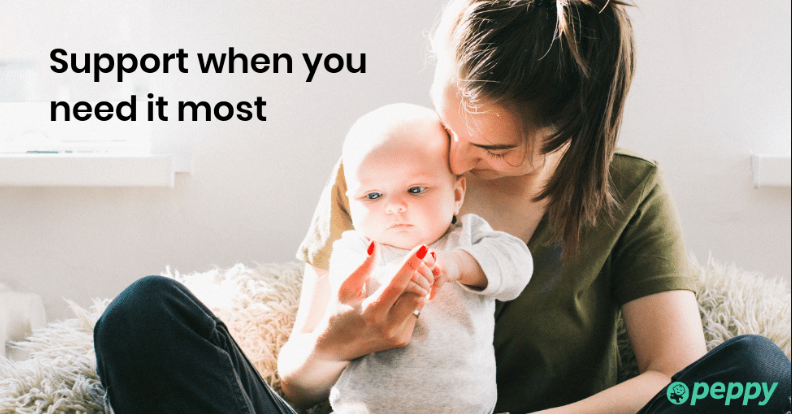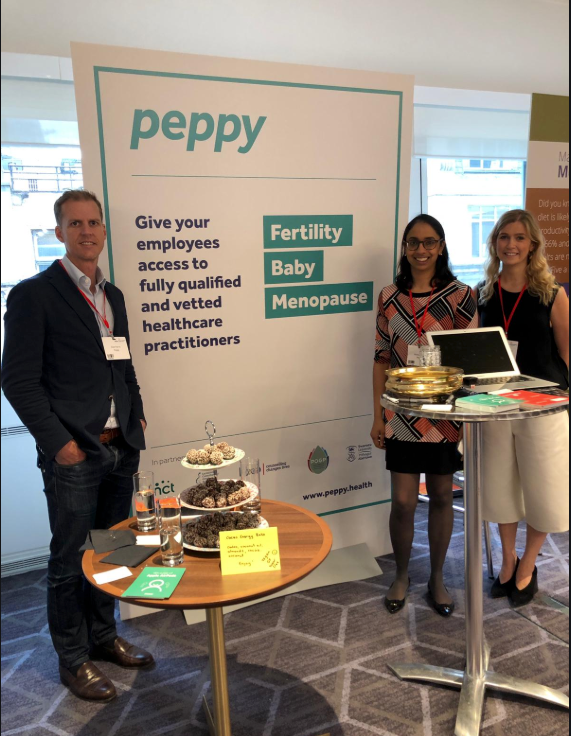The support you wish you’d had — Peppy
Recently, I had the chance to catch up with Mridula, CEO of Peppy Health* and we spoke about the real cost of lost human capital at work and beyond, the future of insurance that employers provide their teams and everything in between.
*For some background about what Peppy does, it gives employers a totally new range of employee benefits that have a huge impact on staff attraction, productivity and loyalty — benefits that people actually want. Their first products support new parents and women dealing with the challenges of menopause, with more in the pipeline.

We often forget that throughout someone’s life, there can be massive changes in their home circumstances that impact their happiness, well-being and career prospects. From their employer’s point of view, this can radically change that person’s productivity and engagement at work, as well as driving attrition and the gender pay gap.
Peppy was born out of the desire to support people during these challenging times and Mridula, during our chat, shared her views with me during our conversation, which we’ve transcribed below:

Carlos:
When I first met you, and before we invested in Peppy, I remember you telling me that there are two or three major points in someone’s life that can fundamentally change their outlook, the economic opportunities open to them, and their wellbeing.
For our readers, what are those points?
Mridula:
Three obvious ones are going through fertility treatment, becoming a parent and going through the menopause. Anything that causes somebody to sit back and re-evaluate their working life — hours, location, the kind of career or career track they want. There are more than you might think, and they’re typically less to do with what’s happening at work and more about what’s happening in your personal life. In their own ways, each of these events changes you and often you need extra support.
The question is what happens at these inflection points? You might be lucky enough to get the right support at the right time. But the reality is that all too often you’re left on your own and your physical, mental and emotional health can spiral downwards, affecting your decisions about work.
Carlos:
So what’s interesting is that, to date, a lot of that was dealt with privately, right? Why are employers starting to care now?
Mridula:
Historically, yes, these were considered ‘private’ matters for the individual to deal with. But we now have an ageing population, smaller families and all forms of public healthcare are stretched to the max. The result is that people feel isolated and unsupported when they go through these transitions, while still working in demanding jobs. Supporting them just makes good business sense.
The bulk of the life transitions we are talking about are not covered by either private medical insurance, employee assistance programmes or occupational health. There’s a gaping void — which we conservatively value at £6b in the UK alone — and women are penalised disproportionately, resulting in absence, attrition and ultimately the gender pay gap.
Carlos:
So if the government and existing benefits providers don’t provide much support, what do employees do now?
Mridula:
This might sound shocking but our users tell us that they relied on Google and Facebook before finding Peppy. That’s probably the worst solution in the history of healthcare!
Carlos:
Wow, that’s not good.
Mridula:
It really isn’t. And on top of this we’re all working for longer, so as you said earlier, it all comes down to the cost of human capital for employers. Take the menopause as an example, in 1900 a woman would typically go through it at 45 and yet back then life expectancy was only 50 or 60. Whereas today a British woman typically goes through the menopause at 51, and lives until 88 on average. She can expect to be working for at least another decade, maybe two. Suddenly this becomes a workplace issue and we need support like never before.
We have a war for talent right now, across a whole range of skills. This is true whether employees are data scientists or nurses. If you’re not able to support and retain them, then you lose access to a huge chunk of your critical workforce capacity. Or consider housekeeping staff at a hotel chain. We’re in a particular situation right now in the UK, where employers cannot attract and retain that workforce from the EU, leaving a big gap.
Even losing one person can be hugely disruptive and costly. You can easily incur costs up to 12 months of salary by the time that person’s had time off, made the decision to leave, you advertise and fill the position, and train the next person up.
Carlos:
… and you lose obviously the technical expertise and the relational expertise these people bring, which is tricky, right? Ultimately it comes down to managing people and when key people leave you, your organisation ends up in flux.
Now when it comes to the services specifically, maybe you can walk us through what are the services that are required? If now’s the time for employers to engage, what are the services that are actually necessary to engage?
Mridula:
Before becoming a parent for the first time, or going through menopause, most people don’t think too much about the realities of life on the other side of that transition. There are a lot of taboos around these topics (for example, postnatal depression in dads), so first of all, there is a need for trusted information. Secondly, people want reassurance on what is and isn’t normal. Should I be worried that my newborn baby only sleeps 2 hours at a stretch? Will this eventually pass? You don’t feel like yourself, there’s something not quite right, but you don’t know what it is. Thirdly, there’s a huge need for signposting you towards your options, so “What you’re describing is X and therefore you can try Y or speak to your GP about Z.”
Put simply, Peppy is like having an expert best friend on hand to answer any questions you might have, to direct you to trustworthy sources of information and to connect you to the specialist practitioners you might need access to — a lactation consultant, a menopause nurse, a fertility specialist, etc, etc….
Chat is the backbone of our services: direct access to a certified expert who understands what you are going through. Our users are busy and they love the convenience it offers. It’s how they communicate with their friends.
Our experts also understand what issues might be coming up and can help people prepare for them. Right now our weekly average user rate is 80%. This compares to <1% for conventional products.
Carlos:
Connecting with experts is always great but it sounds like it would get expensive very quickly? How do you make that work?
Mridula:
This is another reason why chat works so well. Somebody will have a question, maybe five or six interactions back and forth and then maybe nothing for the next 5 days.
So basically, a small team of experts can service a large number of people. We allow for a certain level of support that we know the typical person needs. Some people need more, some people need less, but the result is that we can offer incredibly generous employer benefits packages for very reasonable fees.
We also have an incredible potential to improve the productivity of our experts by leveraging the chat data to drive smart content. The journeys that users go through are remarkably similar. There are outliers of course but we can already see how we deliver a personalised care with incredible efficiency.
Carlos:
Insurance is evolving and InsureTech players are offering new products and services. Is this ultimately something that insurance providers will do, or is this a new category of insurance that employers will engage with, in addition to any existing insurance products or to their detriment?

Mridula:
Peppy is effectively a new category of insurance. Current medical insurance is about diagnostics and medical treatment for a serious injury or disease. These are low probability, very high intensity/cost events. We’re dealing with higher probability events, but with lower cost interventions that have a big impact when it matters the most for employers, employees and their families.
Insurance providers also provide services such as mental health support but it’s totally general. A 21 year old with suicidal thoughts will be given the same therapist as a 38 year old mum with postnatal depression or a 51 year old woman who is anxious while going through menopause — and that last example is likely to be a misdiagnosis! We offer highly specialised mental health support with deep experience in the transitions that our users are going through. We expect this to be a huge source of growth in the future.
Carlos:
What do you think will be the biggest HR challenges for organisations in the next 5 years?
Mridula:
Fortunately for us the answer to that is 100% clear: get ‘inclusion’ right in its broadest sense. We’ve spoken to literally hundreds of people professionals and everyone is struggling to work out how to attract and retain the best employees as the expectations of the workforce shift dramatically. Talent of all ages, different backgrounds, gender and abilities is more valuable to employers than ever before.
Increasingly, all employees have different needs at different stages of their lives — whether it’s someone who’s trying to conceive, a dad or a mum with small kids who wants to be more involved in child-rearing, a midlife woman who is experiencing menopause, or anyone who is caring for an elderly or sick relative. Today, women take a disproportionate hit on all these fronts. As we live and work for longer, both men and women are realising that our working lives are a marathon, not a sprint. They want to bring their whole selves to work and are less and less willing to tolerate workplaces that don’t support them at the right points in their life.
The role of HR and managers is to create an environment where people can thrive and feel supported to do their best work. The successful companies of the future will be the ones that get this right and Peppy enables them to do that.
Carlos:
Thanks Mridula. You’ve certainly given me lots to think about. All of this ties in to big investment themes like the future of work and women’s health. Considering the size of the opportunity it’s still an untapped space. I’m really excited to see Peppy continue to grow.
Mridula:
Thanks Carlos. It’s been great talking to you.
If you’d like to learn more about Peppy, feel free to get in touch with them here — hello@peppy.health or via their website.